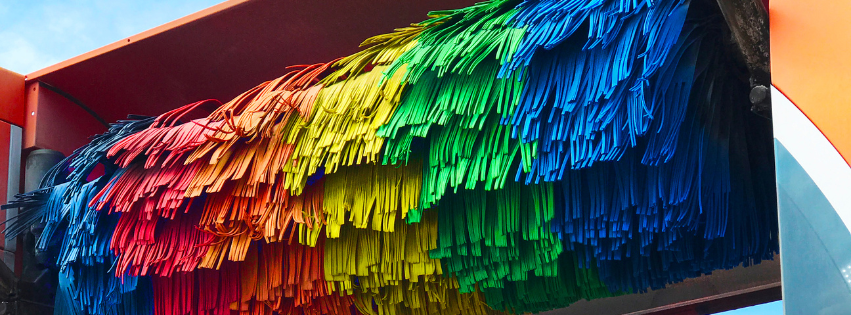Car Wash Chemicals: The Science Behind a Spotless Shine
Understanding the Right Chemical Solutions to Boost Efficiency, Vehicle Safety, and Profitability

The Role of Chemicals in Car Wash Operations
Car wash chemicals are the backbone of a professional auto wash system. They do much more than make soap bubbles—they help loosen dirt, protect vehicle paint, and ensure water efficiency. The right combination of car wash chemicals not only guarantees customer satisfaction but also prolongs equipment life and boosts business profitability.
A successful car wash business depends on understanding the science behind these products. From pre-soaks to waxes, every solution plays a crucial role in delivering that showroom-ready shine customers love.
Common Types of Car Wash Chemicals
1. Pre-Soak Solutions
Pre-soak chemicals are the first line of defense against grime. They contain surfactants that break down road film, grease, and oil before the main wash. Alkaline pre-soaks are ideal for removing organic materials like mud or insects, while acidic pre-soaks neutralize minerals and brake dust.
2. Detergents and Shampoos
Car wash soaps are specially formulated to clean without harming paint or wax layers. pH-balanced and biodegradable options are preferred because they’re safer for both the car’s surface and the environment. They generate rich foam that lifts contaminants while reducing friction during the wash process.
3. Wheel and Tire Cleaners
Wheels are the dirtiest parts of a vehicle, collecting brake dust, tar, and oil. Wheel cleaners often use a low-pH (acidic) or high-pH (alkaline) formula to dissolve contaminants effectively. Choosing non-corrosive, alloy-safe formulas protects rims and avoids costly damage.
4. Degreasers
Heavy-duty degreasers target stubborn buildup on engines, undercarriages, and wheel wells. These contain solvents and emulsifiers that dissolve petroleum-based residues. Always follow dilution guidelines, as concentrated degreasers can strip paint or protective coatings if misused.
5. Glass Cleaners
Glass cleaners remove fingerprints, film, and smudges without streaking. Ammonia-free versions are recommended, especially for tinted windows, as they prevent discoloration or damage to window films.
6. Surface Protectants and Waxes
After cleaning, applying a wax or polymer sealant helps protect the vehicle’s finish. These create a hydrophobic (water-repelling) barrier, allowing water and dirt to slide off easily. Regular application enhances gloss and provides UV protection, which preserves paint longevity.
7. Drying Agents
Drying agents reduce surface tension, allowing water to bead and roll off quickly. They speed up the drying process and prevent water spots, which improves customer satisfaction and throughput in automatic car washes.
8. Specialty Additives
Some operations use fragrances, color foams, and conditioners to enhance customer experience. These additives provide sensory appeal, reinforcing the perception of cleanliness and luxury.
Choosing the Right Car Wash Chemicals
Selecting the best chemicals involves balancing performance, safety, and cost-efficiency. Key factors include:
- pH Balance: Use neutral or near-neutral products to minimize damage to paint and coatings.
- Dilution Ratio: Overly concentrated mixes can corrode surfaces; under-diluted ones waste money and water.
- Environmental Compliance: Choose biodegradable and phosphate-free chemicals to comply with environmental regulations.
- Equipment Compatibility: Ensure that chemicals work smoothly with your car wash system, from brushes to reclaim water systems.
- Supplier Reliability: Partner with reputable suppliers who offer technical support and consistent product quality.
The Importance of Eco-Friendly Car Wash Chemicals
Sustainability is now a major trend in the car wash industry. Eco-friendly chemicals reduce harmful runoff, minimize waste, and enhance brand reputation. Biodegradable detergents, low-phosphate pre-soaks, and water reclamation systems can dramatically cut a car wash’s environmental footprint.
Many municipalities have strict regulations on chemical disposal, so using green-certified products can prevent penalties while appealing to environmentally conscious customers.
For guidance on implementing sustainable wash practices, visit International Carwash Association’s WaterSavers Program.
Maximizing Chemical Efficiency
Proper chemical management saves money and improves performance. Calibrate your chemical dispensing system regularly to ensure correct dilution. Train staff to apply the right amount of product—too little reduces cleaning effectiveness, while too much increases operational costs and waste.
You can also integrate chemical monitoring systems that automatically adjust ratios based on water hardness and temperature, optimizing wash consistency.
For modern automation systems and chemical control tools, explore Car Wash Management Solutions.
Maintaining Safety Standards
Car wash chemicals, while powerful, can pose health risks if mishandled. Always use personal protective equipment (PPE) such as gloves and goggles. Store chemicals in labeled, ventilated areas and follow the manufacturer’s Material Safety Data Sheets (MSDS) for handling and disposal instructions.
Safety compliance doesn’t just protect workers—it builds trust with customers who value responsible operations.
The Bottom Line
Understanding and managing car wash chemicals is essential to running a profitable, safe, and eco-conscious operation. When used correctly, these chemical solutions don’t just clean—they elevate your brand’s reputation and efficiency.
For a detailed look at chemical systems, sustainable options, and advanced wash solutions, check out Car Wash Management.
